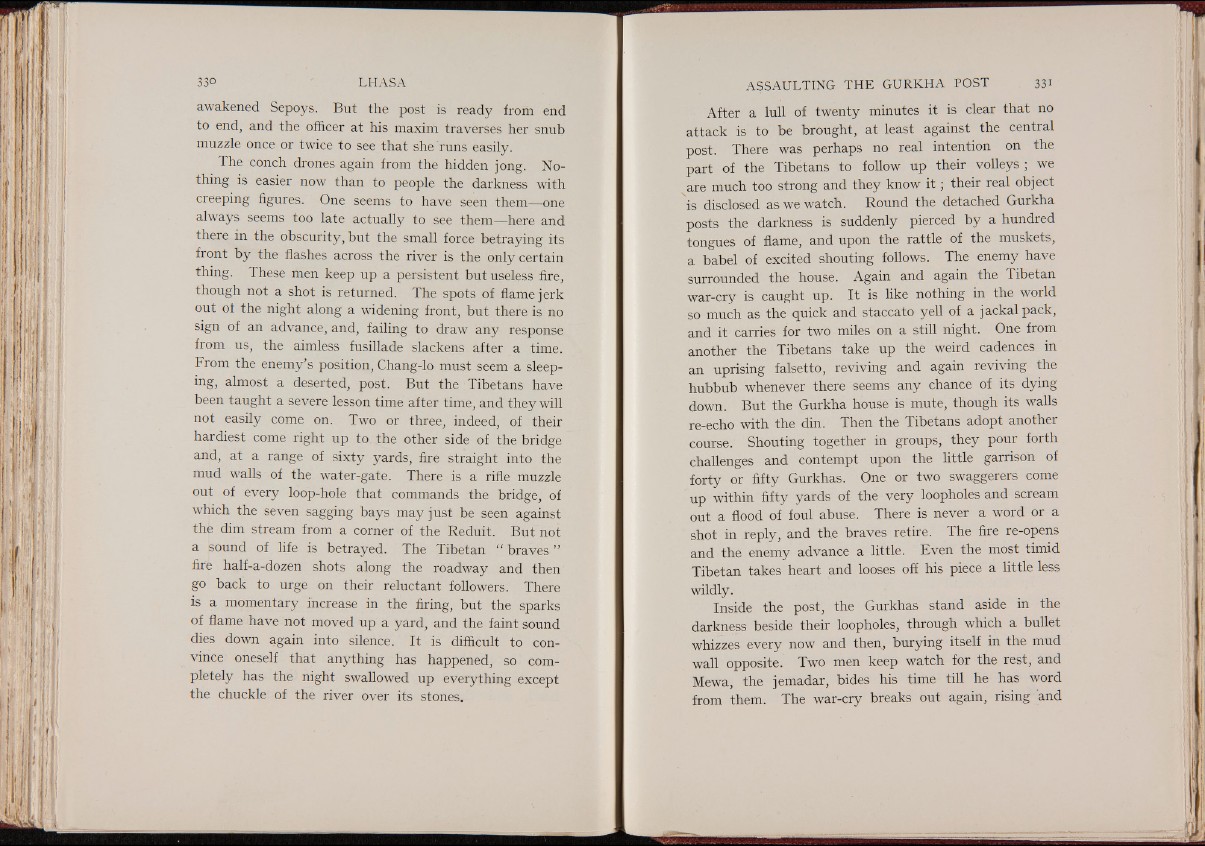
awakened Sepoys. But the post is ready from end
to end, and the officer at his maxim traverses her snub
muzzle once or twice to see that she runs easily.
The conch drones again from the hidden jong. Nothing
is easier now than to people the darkness with
creeping figures. One seems to have seen them— one
always seems too late actually to see them—-here and
there in the obscurity, but the small force betraying its
front by the flashes across the river is the only certain
thing. These men keep up a persistent but useless fire,
though not a shot is returned. The spots of flame jerk
out of the night along a widening front, but there is no
sign of an advance, and, failing to draw any response
from us, the aimless fusillade slackens after a time.
From the enemy’s position, Chang-lo must seem a sleep-
ing, almost a deserted, post. But the Tibetans have
been taught a severe lesson time after time, and they will
not easily come on. Two or three, indeed, of their
hardiest come right up to the other side of the bridge
and, at a range of sixty yards, fire straight into the
mud walls of the water-gate. There is a rifle muzzle
out of every loop-hole that commands the bridge, of
which the seven sagging bays may just be seen against
the dim stream from a corner of the Reduit. But not
a sound of life is betrayed. The Tibetan “ braves”
fire half-a-dozen shots along the roadway and then
go back to urge on their reluctant followers. There
is a momentary increase in the firing, but the sparks
of flame have not moved up a yard, and the faint sound
dies down again into silence. It is difficult to convince
oneself that anything has happened, so completely
has the night swallowed up everything except
the chuckle of the river over its stones.
After a lull of twenty minutes it is clear that no
attack is to be brought, at least against the central
post. There was perhaps no real intention on the
part of the Tibetans to follow up their volleys; we
are much too strong and they know i t ; their real object
is disclosed as we watch. Round the detached Gurkha
posts the darkness is suddenly pierced by a hundred
tongues of flame, and upon the rattle of the muskets,
a babel of excited shouting follows. The enemy have
surrounded the house. Again and again the Tibetan
war-cry is caught up. It is like nothing in the world
so much as the quick and staccato yell of a jackal pack,
and it carries for two miles on a still night. One from
another the Tibetans take up the weird cadences in
an uprising falsetto, reviving and again reviving the
hubbub whenever there seems any chance of its dying
down. But the Gurkha house is mute, though its walls
re-echo with the din. Then the Tibetans adopt another
course. Shouting together in groups, they pour forth
challenges and contempt upon the little garrison of
forty or fifty Gurkhas. One or two swaggerers come
up within fifty yards of the very loopholes and scream
out a flood of foul abuse. There is never a word or a
shot in reply, and the braves retire. The fire re-opens
and the enemy advance a little. Even the most timid
Tibetan takes heart and looses off his piece a little less
wildly.
Inside the post, the Gurkhas stand aside in the
darkness beside their loopholes, through which a bullet
whizzes every now and then, burying itself in the mud
wall opposite. Two men keep watch for the rest, and
Mewa, the jemadar, bides his time till he has word
from them. The war-cry breaks out again, rising and